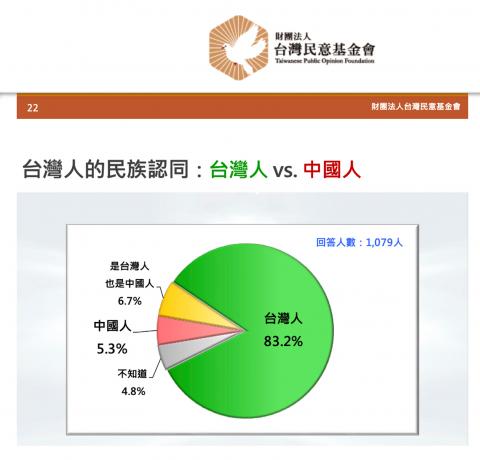Identification as Taiwanese rather than Chinese has surged to 83.2 percent amid the COVID-19 outbreak that began in Wuhan, China, the Taiwanese Public Opinion Foundation said yesterday.
Asked whether they identify themselves as Taiwanese or Chinese, or have other opinions, 83.2 percent of respondents to a poll conducted by Focus Survey Research said Taiwanese, 5.3 percent said Chinese, 6.7 percent said both and 4.8 percent had no opinion or refused to answer.
The results showed that identification as Taiwanese has reached a new high since the foundation’s first such poll in 1991, while identification as Chinese or Chinese and Taiwanese was down by half from a poll in September last year, foundation chairman Michael You (游盈隆) said.

Screen grab from the Wed site of the Taiwanese Public Opinion Foundation
Neither Chinese President Xi Jinping’s (習近平) reiterations of Beijing’s “one country, two systems” formula, nor last year’s protests in Hong Kong led to a significant increase in identification as Taiwanese, which remained at about 70 percent, You said.
There has been an obvious increase since the COVID-19 outbreak, and such change can be seen as significant academically and politically, he added.
Respondents were also asked about the government’s handling of cross-strait issues during the outbreak, with nearly 70 percent voicing approval, and 10.8 percent saying they disapproved, the foundation said.
It is the best rating of the government’s cross-strait policies since President Tsai Ing-wen (蔡英文) took office in May 2016, the foundation said.
Tsai’s overall approval rating was 68.4 percent, compared with 16.5 percent who disapproved, the president’s second-best showing in a foundation poll, while Premier Su Tseng-chang (蘇貞昌) received a 69.4 percent approval rating.
More respondents said they liked the Democratic Progressive Party (41.1 percent), than the Chinese Nationalist Party (KMT) (12.5 percent), the Taiwan People’s Party (9.3), the New Power Party (5.1), the Taiwan Statebuilding Party (1.9) and the People First Party (0.5).
However, 27.2 percent said that they did not favor any party and 0.9 percent said none of the above.
The nationwide poll was conducted on Monday and Tuesday last week and collected 1,079 valid samples. It had a margin of error of 2.98 percentage points.

‘TAIWAN-FRIENDLY’: The last time the Web site fact sheet removed the lines on the US not supporting Taiwanese independence was during the Biden administration in 2022 The US Department of State has removed a statement on its Web site that it does not support Taiwanese independence, among changes that the Taiwanese government praised yesterday as supporting Taiwan. The Taiwan-US relations fact sheet, produced by the department’s Bureau of East Asian and Pacific Affairs, previously stated that the US opposes “any unilateral changes to the status quo from either side; we do not support Taiwan independence; and we expect cross-strait differences to be resolved by peaceful means.” In the updated version published on Thursday, the line stating that the US does not support Taiwanese independence had been removed. The updated

‘CORRECT IDENTIFICATION’: Beginning in May, Taiwanese married to Japanese can register their home country as Taiwan in their spouse’s family record, ‘Nikkei Asia’ said The government yesterday thanked Japan for revising rules that would allow Taiwanese nationals married to Japanese citizens to list their home country as “Taiwan” in the official family record database. At present, Taiwanese have to select “China.” Minister of Foreign Affairs Lin Chia-lung (林佳龍) said the new rule, set to be implemented in May, would now “correctly” identify Taiwanese in Japan and help protect their rights, the Ministry of Foreign Affairs said in a statement. The statement was released after Nikkei Asia reported the new policy earlier yesterday. The name and nationality of a non-Japanese person marrying a Japanese national is added to the

AT RISK: The council reiterated that people should seriously consider the necessity of visiting China, after Beijing passed 22 guidelines to punish ‘die-hard’ separatists The Mainland Affairs Council (MAC) has since Jan. 1 last year received 65 petitions regarding Taiwanese who were interrogated or detained in China, MAC Minister Chiu Chui-cheng (邱垂正) said yesterday. Fifty-two either went missing or had their personal freedoms restricted, with some put in criminal detention, while 13 were interrogated and temporarily detained, he said in a radio interview. On June 21 last year, China announced 22 guidelines to punish “die-hard Taiwanese independence separatists,” allowing Chinese courts to try people in absentia. The guidelines are uncivilized and inhumane, allowing Beijing to seize assets and issue the death penalty, with no regard for potential

‘UNITED FRONT’ FRONTS: Barring contact with Huaqiao and Jinan universities is needed to stop China targeting Taiwanese students, the education minister said Taiwan has blacklisted two Chinese universities from conducting academic exchange programs in the nation after reports that the institutes are arms of Beijing’s United Front Work Department, Minister of Education Cheng Ying-yao (鄭英耀) said in an exclusive interview with the Chinese-language Liberty Times (the Taipei Times’ sister paper) published yesterday. China’s Huaqiao University in Xiamen and Quanzhou, as well as Jinan University in Guangzhou, which have 600 and 1,500 Taiwanese on their rolls respectively, are under direct control of the Chinese government’s political warfare branch, Cheng said, citing reports by national security officials. A comprehensive ban on Taiwanese institutions collaborating or